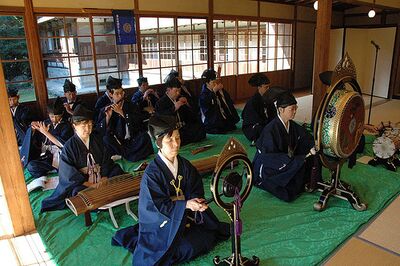Difference between revisions of "Gagaku"
(Created page with "right|thumb|400px|A ''gagaku'' performance at the [[Sankeien in Yokohama]] *''Japanese'': 雅楽 ''(gagaku)'' ''Gagaku'' is the classical cou...") |
m (not really art or architecture) |
||
| Line 13: | Line 13: | ||
*Gallery labels, Metropolitan Museum of Art. | *Gallery labels, Metropolitan Museum of Art. | ||
| − | |||
[[Category:Poetry and Theater]] | [[Category:Poetry and Theater]] | ||
[[Category:Nara Period]] | [[Category:Nara Period]] | ||
[[Category:Heian Period]] | [[Category:Heian Period]] | ||
Revision as of 17:47, 17 October 2014
- Japanese: 雅楽 (gagaku)
Gagaku is the classical court music of the Japanese Imperial court. It derives significantly from continental court music, and was adopted by the Japanese court as the official genre or style of court music in 701.
Gagaku is divided into two sub-categories, representing the two main threads of continental influence. Musical elements derived from Chinese influence are known as Tôgaku (Tang music) and those from Korean influence komagaku (Koryo music).
Instruments used in gagaku include the biwa (a stringed lute), a variety of flutes including the shô, ryûteki, hichiriki, and komabue, and a variety of drums, including the kakko and tsuridaiko, as well as bells, gongs, and occasionally koto. Performances are often accompanied by masked & costumed dances.
References
- Gallery labels, Metropolitan Museum of Art.
